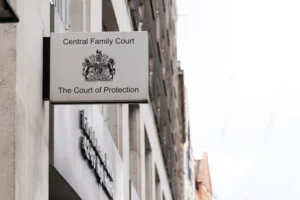The Same-Sex Divorce Process

Contact
Table of Contents
Understanding same sex divorce isn’t just about legal steps — it’s also about recognising the unique challenges that LGBTQ+ couples might face when a marriage or civil partnership comes to an end. While the law now treats all marriages equally, couples facing a same sex divorce may still find the process emotionally and practically complex. This guide explains how divorce or dissolution works for same-sex couples under current law in England and Wales.
What happens when a same-sex relationship breaks down?
When any relationship ends, it can be emotionally and legally complex, and same-sex couples are no exception. If you’re married, you’ll need to apply for a divorce in the same way as any other married couple. If you’re in a civil partnership, the legal process is called a dissolution.
Both processes follow similar steps and are governed by the same principles, including the no-fault divorce rules introduced in 2022. Whether you’re separating after a few years or a much longer relationship, it’s important to get clear legal advice tailored to your circumstances.
What makes same sex divorce unique?
While the legal process of same sex divorce is now identical to that of opposite-sex couples, there are still unique personal and practical challenges that may arise. For example, couples in a same-sex relationship may have been together for many years before they were legally allowed to marry, meaning pre-marital assets or property divorce may become points of contention.
In some cases, same-sex couples may also face complexities around family acceptance, social stigma, or cultural pressures — all of which can affect how the divorce unfolds emotionally and practically. These factors often require sensitive handling from both legal representatives and support networks.
How do you get divorced as a same-sex couple?
The new no-fault divorce laws and the removal of the previous five “grounds” simplify the process, whether you’re going through a same sex divorce or ending an opposite-sex marriage.
In the eyes of the law, same-sex marriage is exactly the same as opposite-sex marriage. Since the introduction of no-fault divorce in April 2022, either party can apply for a divorce on the ground that the marriage has broken down irretrievably. There is no longer a need to rely on facts such as unreasonable behaviour or separation.
It’s also important to note that adultery as a legal ground no longer plays a role under the new no-fault rules. If one party has been unfaithful, this can still be relevant when discussing financial settlements or child arrangements, but it is not needed for the divorce application itself.
The process for divorce is the same regardless of whether you are a same-sex couple or an opposite-sex couple. To start proceedings, the couple must have been married for at least a year and one party must file a divorce petition via the online divorce portal.
- Looking for more information? You may want to read our step-by-step guide on getting divorced.
Can you contest a same sex divorce?
No. Since the introduction of no-fault divorce in April 2022, it is no longer possible to contest a divorce, including a same sex divorce. The statement that the marriage has broken down irretrievably is considered final, and the court does not require any further justification or proof. This change has made the legal process quicker, more straightforward, and less hostile for all couples, including same-sex partners.
How do you dissolve a civil partnership?
You end a civil partnership in England and Wales by applying for a ‘dissolution order’. The process is virtually identical to the divorce process. You’ll need to have been in the civil partnership for at least 12 months before applying for a dissolution, and since April 2022, the no-fault rules also apply to civil partnership dissolution. That means you no longer need to provide a specific reason — simply stating that the relationship has irretrievably broken down is enough.
If your partner agrees to the dissolution of your civil partnership, the court will review the papers and make a Conditional Order of dissolution. The conditional order is like a Decree Nisi in divorce. It shows that you are legally entitled to end the civil partnership.
After the Conditional Order is made, you must wait six weeks and one day (43 days) before you can apply for a Final Order. This legally ends the civil partnership in the same way that a Decree Absolute legally ends a marriage.
- Looking for more information? You may want to read Fertility & Parenting Law for LGBTQ+ Families
Choosing the right solicitor for a same sex divorce
Although the legal framework for divorce is now the same for all couples, a solicitor experienced in same sex divorce can provide tailored advice and emotional understanding of the issues that LGBTQ+ clients may face.
Claire Andrews is a specialist divorce lawyer with a particular emphasis on complex high net worth divorce cases often involving a trust element. She is also featured in The Legal 500 as a recommended lawyer.
To speak with Claire, please call, or complete an online enquiry form.
Share this article

“Osbornes Law offers affluent clients representation in high-value, complex family matters.”
“Osbornes have a first-class family law team providing an excellent service for their loyal clients.”
Claire Andrews is one of the best of the younger crop of partners in London. She has client care skills in spades and is understanding and empathetic whilst keeping a focus on the right strategy.
"Claire Andrews is an associate to watch. Tenacious, diligent, professional and astute. She is very impressive."
Divorce InsightsVIEW ALL
- 5.2.2026
Can I Claim Compensation for Lost Earnings in...
In this short video, our divorce solicitors discuss compensation claims in divorce, why they are challenging to argue, and the...
Read more - 29.1.2026
Domestic abuse and conduct in financial remedy: MRU...
Summary: Key takeaways Conduct is rarely relevant in financial remedy unless it is exceptional and unfair to ignore In MRU...
Read more - 19.1.2026
Abusive Parent Loses All Rights and Contact With...
Abusive parent loses all parental rights and contact with child Cases in which one parent makes repeated and unmeritorious applications...
Read more - 12.1.2026
Rose Agreements in Divorce: What You Need to...
Rose agreements: as final as a financial remedy order If you’re going through a divorce, negotiating a fair financial...
Read more - 12.1.2026
Xydhias Agreements Explained
Xydhias agreement: a maintenance deal that can be varied Where the parties reach an informal financial agreement (known as a...
Read more - 8.12.2025
Financial Claim 20 Years After Divorce Fails
Financial claim 20 years after divorce fails due to settlement agreement and lengthy delay The Family team at Osbornes Law advises...
Read more - 1.12.2025
Matrimonialisation: Pre-Marital Assets in Divorce Explained
Matrimonialisation: husband’s shareholding included as ‘non-marital’ element The financial remedies team at Osbornes Law advises clients seeking a fair...
Read more - 31.10.2025
Does Cohabitation Affect Divorce Financial Arrangements?
Can living with someone new affect your divorce financial arrangements? For some, starting a new relationship will feel like the...
Read more - 28.10.2025
Family Court Can Reject Welfare Expert’s Recommendations
When judges disagree: family court’s power to override expert welfare advice At Osbornes Law, the family team supports clients...
Read more - 27.10.2025
Parental Involvement Presumption Set to End
Government to scrap presumption of parental involvement in child arrangements cases At Osbornes Law, the family team represents parents and...
Read more - 26.9.2025
Court Refuses to Penalise Husband’s Conduct in £30...
In a £30 million divorce case, a husband’s lies, lavish spending and controlling behaviour weren’t enough to sway the...
Read more - 26.9.2025
When Dishonesty Undermines a Prenup: Lessons from Helliwell...
The impact of dishonesty on prenups The Court of Appeal has made clear that even the wealthiest clients must play...
Read more - 22.9.2025
Forum Disputes in International Divorce: SK v RR [2024]...
How do UK courts decide which country handles an international divorce? When it comes to divorce or other family matters...
Read more - 15.9.2025
Wife Awarded £15m After Sham Trust Exposed
Wife wins £15m lump sum after ex’s ‘sham’ trust failed ‘Power tends to corrupt…’ goes the well-known saying – the...
Read more - 9.9.2025
Can I Move Assets During Divorce?
Can I move assets to a family member during my divorce? The breakdown of a marriage often leads to difficult...
Read more - 29.8.2025
Witness Statement Deadlines in Divorce: Miss Them and...
Missing deadlines in divorce proceedings: a lesson from AB v CD [2025] The case of AB v CD (2025) EWFC 253 (B) was...
Read more - 28.8.2025
Relocating with Your Child? Plan Thoughtfully
Planning to relocate with your child? Your case depends on a child‑focused, realistic plan Re Simon [2025] EWFC 249 highlights the...
Read more - 7.8.2025
Divorce Asset Transfers Can Be Reversed
Transferring assets to deliberately avoid financial claims will be reversed The financial settlements team at Osbornes Law represents clients in...
Read more - 17.7.2025
Financial Remedies: Impact of Delay in Divorce Cases
What’s the risk of delaying my financial remedies claim? The financial remedies team at Osbornes Law acts for clients...
Read more - 4.7.2025
Standish v Standish: What Counts as Matrimonial Property?
Supreme Court upholds Court of Appeal decision In a landmark ruling handed down on 2 July 2025, the Supreme Court upheld an...
Read more - 19.6.2025
How Civil Restraint Orders Prevent Court Abuse
Civil Restraint Orders: an important tool to prevent vexatious claims Civil restraint orders can be imposed on individuals who repeatedly...
Read more - 13.6.2025
Divorce Advice for Women
Why women need tailored divorce advice Divorce can have significant consequences for women, particularly if they are not the family’...
Read more - 11.6.2025
Property Value Drop Won’t Change Financial Order
Drop in matrimonial home value is not enough to overturn a financial order, says Court The financial remedies team at...
Read more - 16.5.2025
Race Across the World: A Lesson in Friendly...
What can we learn from Race Across the World about having a ‘good’ divorce? Race Across the World is (in...
Read more

























